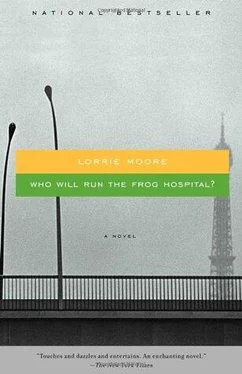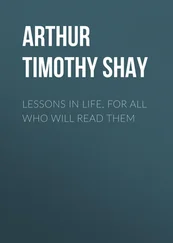“Oh, yeah. Let’s go,” I said. She had the next day off.
“Oh, good,” she said. “I feel like I never see you anymore.”
Later, as an adult, when I was wonderfully used to long, important conversations in restaurants or bars — books, love, politics, science — talk that licked about like a flame, talk that traveled like roads into the night, guided, or urged, I suppose, by drink and hunger, or some chaos of the heart, it seemed to me strange that I had ever enjoyed spending those nights at the Sans Souci with Sils, because I don’t recall what we ever talked about. I don’t think we had real conversation. We were guitarless, without our music books, we couldn’t sing. But we didn’t really talk, either. We drank and bantered and remarked and gazed around and once in a while when the music got too loud we shouted something at each other and laughed. We smoked cigarettes, the strange brazen dare of it never abating for us, even though it was only one of so many dares we made, over and over. We ordered gin and tonics and held each one up to the black lights on the ceiling to marvel at the spooky blue and then to drink it. We had no idea what life had in store for us; not a clue, not a thoughtful thought. Inevitably a guy — older, drunker — came over to try to pick up Sils. Almost sixteen, she was the sort of fifteen-year-old who looked twenty. I, to my own shame and uncertainty with the bouncer, was the sort who looked twelve.
“How yew girls doin’?” was inevitably how it began, and then usually the guy fussed with the front lock of Sils’s hair, pulling it out of her eyes, or he sat next to her, hip to hip, or he asked what she was drinking or did she want to dance to this song, it was a good song for dancing, it was a good night for dancing, didn’t she think so?
Usually it was a humid night, the boards of the place dank as a river dock. Sometimes I protected her with gruffness or a smirk or a cryptic look to make the guy think we were making fun of him. That he was too old. “It’s only teenage wasteland,” wailed the jukebox during the band’s breaks. I would nudge her.
But sometimes I got up and went to the bathroom, let her deal with him, and sometimes later he would give us a ride home at eleven-thirty, hoping for her, dreaming, waiting for us at the corner while we went to one or the other of our houses, said good night to our mothers, went to our room, stuffed pillows under the covers, making curved and lumpy bodies, then climbed out the window.
They didn’t seem to mind, these men. I swear: often they just didn’t seem to mind. They were half in love already; they were wishing. They wanted servitude to Sils, to get close to her, the prettiness, the breasts, the elegant neck, the long hair fragrant with a girl’s shampoo. We’d dash back to the corner to meet up, and the guy would still be there and we’d climb in, Sils in the front, I in the back, and we’d head up to the lake again and I’d watch the guy’s right arm go slowly up, stealing up behind Sils on the car seat, making its way around her, a cheap stole, and I’d pray there wasn’t a gun. I was a Baptist and had always prayed, in a damp squint, for things not to happen. Sils was a Catholic, and so she prayed for things to happen, for things to come true. She prayed for love here and now. I prayed for no guns. Once, the year before, there had been a gun, a pistol fetched from the guy’s left boot and waved at us in a wobbly way with his right hand. Our hearts beating and the doors unlocked, when he stopped at a Stop sign, we pushed open the car doors and flew out.
Here he was, a man with spurs and a cowboy hat, wildly pointing a gun at two fourteen-year-old girls, yet stopping, carefully, at all the Stop signs. And so we leaped out and made a dash for it along the road, into some trees, but he got out too, leaving the car running, and chased us with a flashlight, firing his gun once into the air.
Sils froze. I stopped and saw her standing there and so went back, and he burst upon us, crashing through the underbrush, waving the gun. He backed us up against a row of pines and shouted at us to take off our clothes. Sils started to, so then I did too, what else could we have done? I stripped to nothing and stood there in the woods, bare feet on the pine needles and bony roots, one hand behind me clutching the branch of a buckthorn bush, the night sky an eerie, muggy slate, not as dark as it should have been because the moon, though fuzzy from rain, was full as a coin. He looked at me first, shining the light up from my feet, along my scrawny legs and hips and chest to my face and then he laughed coarse and bemused and moved away to flash on Sils, starting from her face, moving down along her shoulders and woman’s breasts and girl’s tight stomach and legs. “That’s right,” he said, moving toward her, and then he put the gun down, “that’s right,” and in the light of the flashlight he still awkwardly held, the beam zigging and zagging, he began to take off his own clothes, not just his pants and spurred boots, but his shirt and his watch and hat, and that’s when I looked at Sils and cried out, and then we both twisted and ran, bolted, naked, tearing our already tough feet, bruising the arches on stones, going fast and blind the three miles it took to get us through the woods, making our way toward one group of trees and then another and another, until we were out the other side, over the new highway overpass and down the Bay Road to Dix, then home, back in through the window before dawn. We sank down, catching our breaths. We lay in bed, next to the pillow bodies, not knowing what we felt; we reminisced our lost outfits.
No dude-ranching man ever got hold of us like that again. We were more careful from then on. We studied the eyes, and the backseats, to make sure there wasn’t anything strange in them. We were fools, but we wanted things: summer, night, drink, air on our arms, the swell of music, the achy swell of music, or the quiet of the lake roads with no cars, past the parking lot, asters and seeding grass on the side, and us walking, smoking joints, letting the smoke burn and prick our lungs, our legs languid, our eyes stained calm, our legs in a matched pace before we turned and went back inside to dance. Conspirators. Emotional business partners. That’s what we were.
Years before, when we were eleven, we’d already begun our myriad personal rituals of assertion and disguise. We’d pretend we were teenagers, put on our “baby doll” dresses, a style briefly popular in the sixties: puffy sleeves and epaulets through which you could thread the chain of a color-coordinated change purse. We’d smear our lips with Yardley lip gloss, plastic pots of strange, sticky pink, which we applied and devoured and which would probably later cause an array of small, inoperable tumors, but from early on it was what we required. Applying thick, distracting tints to my lips was a habit I retained into adulthood, though sloppily, headed for a middle age of hasty, shiny red leaking outside the lines of my mouth, like modern art only scary. As early as sixth grade my teacher had pulled me aside and said, “Benoîte-Marie, what are you wearing on your lips?”
“Nothing,” I replied, my first lie to an institutional figure, but I’d felt cornered.
She looked all around my face. She looked at my earrings, which were silver cake decorations I’d glued on with Elmer’s.
One of the candies had fallen off in recess and now I had a big scab of glue on my ear. I reached up and picked at it.
“Are you wearing one color on your top lip and a different one on your bottom?” she asked, incredulous.
I was. I thought it looked better that way. Why did she have to be so harsh, with her widow’s eagle eye? I had once brought her lilacs, and she’d sent me straight to the principal’s office. She knew they were from a neighbor’s bush and not my own. Our yard had no lilacs.
Читать дальше












